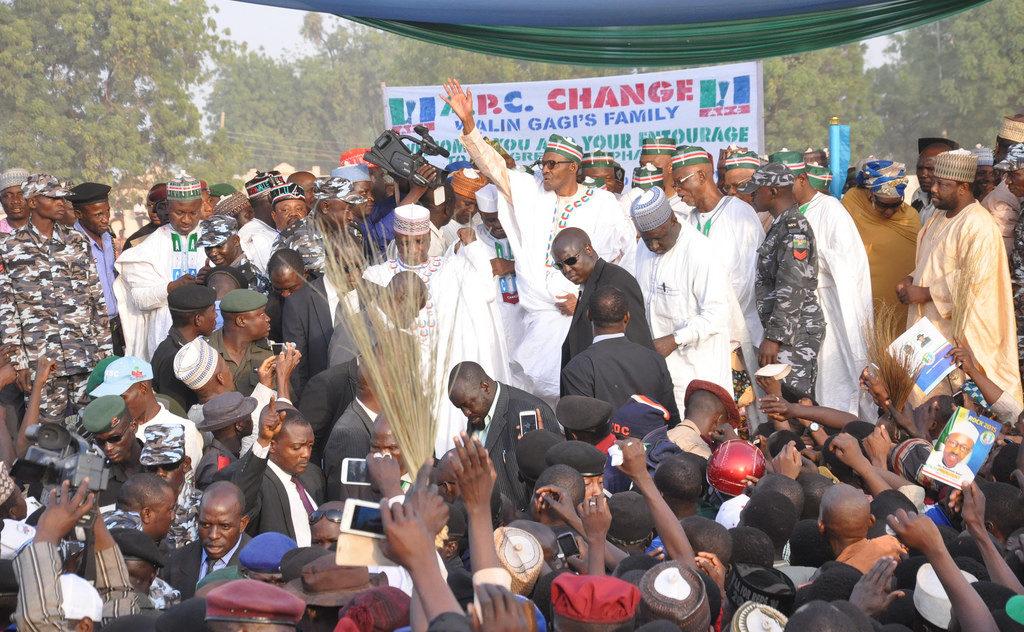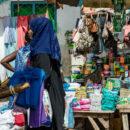Why whistle-blowing won’t save Nigeria

A new whistle-blowing policy has led to some spectacular seizures of looted funds. But short-term thinking can only lead to short-term gains.

President Buhari vowed to root out corruption in office, but his efforts have drawn mixed reviews. Credit: Heinrich-Böll-Stiftung.
In just four months, Nigeria has reportedly recovered a colossal N17 billion ($57 million) in looted funds thanks to a new whistle-blower policy. This initiative, launched by President Muhammadu Buhari late last year, allows citizens to report financial misconduct or suspicious economic activity anonymously. If the tip-off results in funds being recovered, the whistle-blower is rewarded with up to 2.5-5% of the seized money.
Since it was launched, the whistle-blower policy has led to thousands of tip-offs and several big raids. In February, for example, $9.8 million was recovered from a building belonging to Andrew Yakubu, former group managing director of the Nigerian National Petroleum Corporation. This April, $43 million was discovered at an apartment in Lagos after a similar tip-off.
These spectacular seizures have generated some excitement about the “war on corruption” led by Nigeria’s Economic and Financial Crimes Commission (EFCC). But while this optimism is understandable in a country that routinely loses billions of dollars to high-level graft, the whistle-blower policy will sadly not solve Nigeria’s corruption problems.
[Nigeria: The shattering of the Buhari mythology]
An impartial watchdog
The successes of the initiative so far are commendable. But the first shortcoming of the measure is the fact that it is a policy rather than legislation. The Finance Minister herself has acknowledged this limitation.
The problem with this is that policies in Nigeria are only as effective as those tasked with their execution. This means that a new administration – or even a reluctant official under the current one – can easily undermine the programme. For the whistle-blower scheme to be a genuinely long-term and substantive strategy, it would require legislation with clear parameters and protections that apply through the entire criminal justice system.
[Nigeria: Could “the rift” derail President Buhari’s agenda?]
Even with these laws, however, the whistle-blower policy would still only be able to go so far. Nigeria’s fight against corruption has always been weakened by two underlying problems.
The first of these is the lack of independent institutions that can operate outside the patronage of the presidency, and the lack of political will to create such institutions. For instance, when it comes to the EFCC, which oversees the whistle-blower policy, the president has the power to remove its members “at any time” in the public interest.
Under this set-up, the Commission cannot act truly independently without risking presidential disapproval. And so, for the nearly two decades since its creation, the EFCC has become a political tool, tackling petty fraud and the political opponents of the government of the day, rather than acting as an impartial watchdog.
Buhari was elected to power in 2015 partly on a platform of rooting out corruption. Achieving this in a meaningful way would require initiating reforms to secure the tenure and independence of officials. It would entail proposing constitutional level changes that remove the government’s discretionary powers that were inherited from colonial and military predecessors. And it would include improving investigating and policing capacities, recruiting and training efficient prosecution teams, and strengthening judicial independence and the rule of law.
But the whistle-blower policy does none of this. It may catch a few thieves, but it adds no real value to the institutionalisation of the criminal justice system.
Corruption is the system
The second underlying problem that has long undermined Nigeria’s fight against corruption is the narrow, and often self-serving, definition of the problem adopted by the people tasked with fighting it. The government limits its understanding of corruption to the theft of public funds. And consequently, the solutions proposed are similarly limited in scope.
It is of course true that corruption in Nigeria often entails the theft of millions of public funds. I call this the “corruption of greed”. But corruption in Nigeria also includes what can be thought of as the “corruption of need”.
This refers to commonplace illegal acts that that arise from tensions between legal obligations and the instinct to avoid the adverse effects of them. This is the corruption manifested, for example, by the unpaid government worker who moonlights on duty or solicits bribes for extra income.
Much of this dysfunction is caused by socioeconomic inequalities and conditions that are themselves the result of decades of political patronage, poor policies, and administrative wastefulness.
As the tongue-in-cheek #BringBackCorruption hashtag has emphasised, corruption is not just about trusted officials exploiting a weak system. In many ways, it is the system – the one which millions of Nigerians have no choice but to live by. Reforming this reality requires much more than a smart scheme to ensnare a few high-level criminals.
Short-term strategies
The Buhari administration’s attempt to handle corruption with the lure of a lottery-like pay out for whistle-blowers hints at the country’s underlying dysfunction. The ‘WHISTLE AND WIN’ idea is appealing in a society where up to 70% of the population lives in poverty. But the promise of money in exchange for information is indicative of the classism, socioeconomic inequality, and lack of welfare that pervades Nigeria.
Half a loaf is better than none. But Nigerians should be well aware that the whistle-blower policy does not contain the ingredients needed for a full loaf. The initiative may at best provide some support for existing strategies, but the policy itself and the criminal justice system underlying it continue to be directed politically.
A few big money hauls and convictions can, and should, be celebrated. But Nigeria’s 50-year approach of jumping from one short-term solution to another will not get us anywhere in the long run. It is surely time to blow the whistle on that journey.






